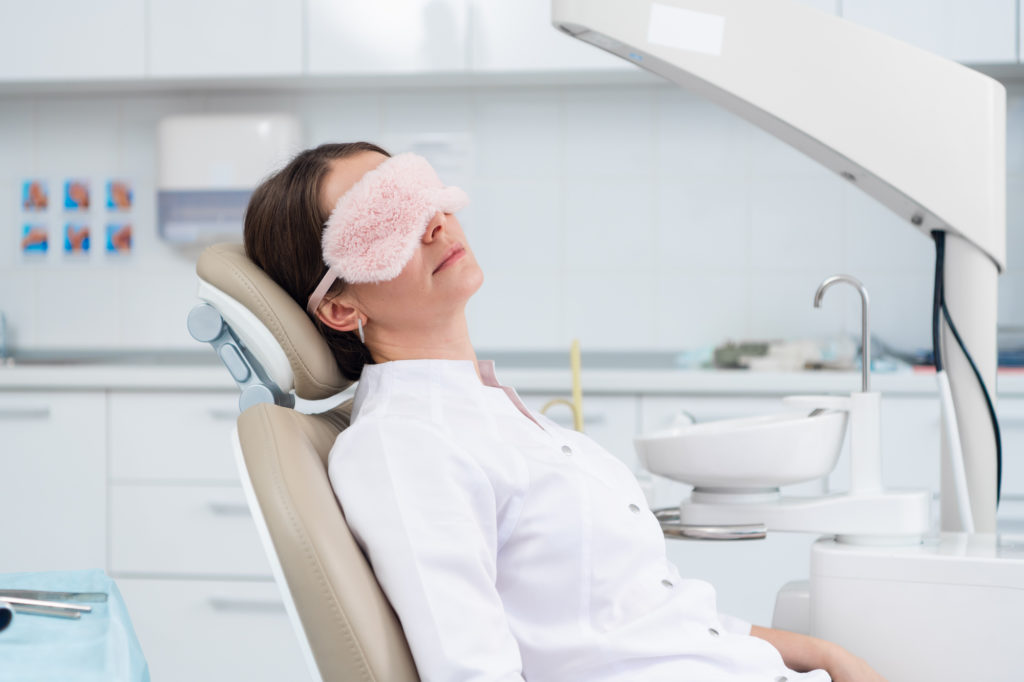
Dental procedures often have a bad reputation for being painful. While modern dentistry has made huge strides in minimizing, or even eliminating, the pain associated with many procedures, no one wants to experience discomfort during treatment, and that can lead to anxiety.
Thankfully, there are many options for sedation that may help to significantly ease your experience at the dentist.
Sedation vs. Local Anesthesia
Many patients confuse sedation with anesthesia, but in practice, they are actually quite different. Local anesthesia is always provided to prevent pain, whereas sedation prevents anxiety. The two can work together to make your experience in the dentist’s chair a comfortable one.
Nitrous Oxide
Nitrous oxide is quite often referred to as “laughing gas,” and it is a fitting nickname. Nitrous oxide is a very safe method of sedation. It has the effect of making a patient calm and relaxed. It can provide a general sense of well-being and sometimes numbness or tingling (which is not unpleasant).
There are many advantages to nitrous oxide. It is inhaled through a breathing apparatus without the need for oral or IV medication. The dosage is easy to manipulate and does not have a negative impact on the body. You will not be asleep and will be aware of what is happening and easily able to talk to your dentist.
The effects are quick to begin and wear off just as quickly, so you can drive yourself home. Nitrous is ideal for a patient with mild anxiety or even for any patient who wants to be more comfortable in the dentist’s chair. It is extremely common for these reasons.
Oral Conscious Sedation
For those who would like another option due to a higher level of anxiety at the dentist, oral conscious sedation is something to consider. This simply means taking a prescription oral medication about an hour before your procedure to become more calm and relaxed. The medication will reduce anxiety and may make you feel sleepy, but you won’t necessarily fall asleep.
The benefits of oral sedation include the fact that it is considered safe, and you will be able to communicate with your dentist during the procedure. This type of sedation may offer a stronger effect than nitrous for those with more severe anxiety.
With oral sedation, however, the effects can linger for several hours. As a result, you will not be able to drive and should go home and rest after your procedure.
Twilight (IV) Sedation
Twilight sedation is not commonly practiced in most general dentist offices, but is more often found in specialty practices such as oral surgery. It is a higher level of sedation that can carry more risks and requires a higher level of monitoring. This medication is given with an IV and will cause a patient to be heavily sedated but not completely unconscious. If you undergo twilight sedation, you will have no memory of the procedure. This is an option for those with more severe dental anxiety.
General Anesthesia
General anesthesia comes with more possible risks and is usually performed by an anesthesiologist in either a hospital or surgery center. Under general anesthesia, the patient is completely unconscious. While this is not a common option for dental procedures, it is available for very young children, people with severe dental anxiety, or those with special needs.
Patient-Centered Dentistry
Hinsdale Dentistry prioritizes gentle dentistry for all ages, and we have extensive experience treating anxious patients. We go out of our way to provide you with a comfortable and relaxed atmosphere. If you suffer from dental anxiety or are simply looking for a more pleasant dental experience, schedule your next dental visit with us so we can make your appointment as easy as possible.